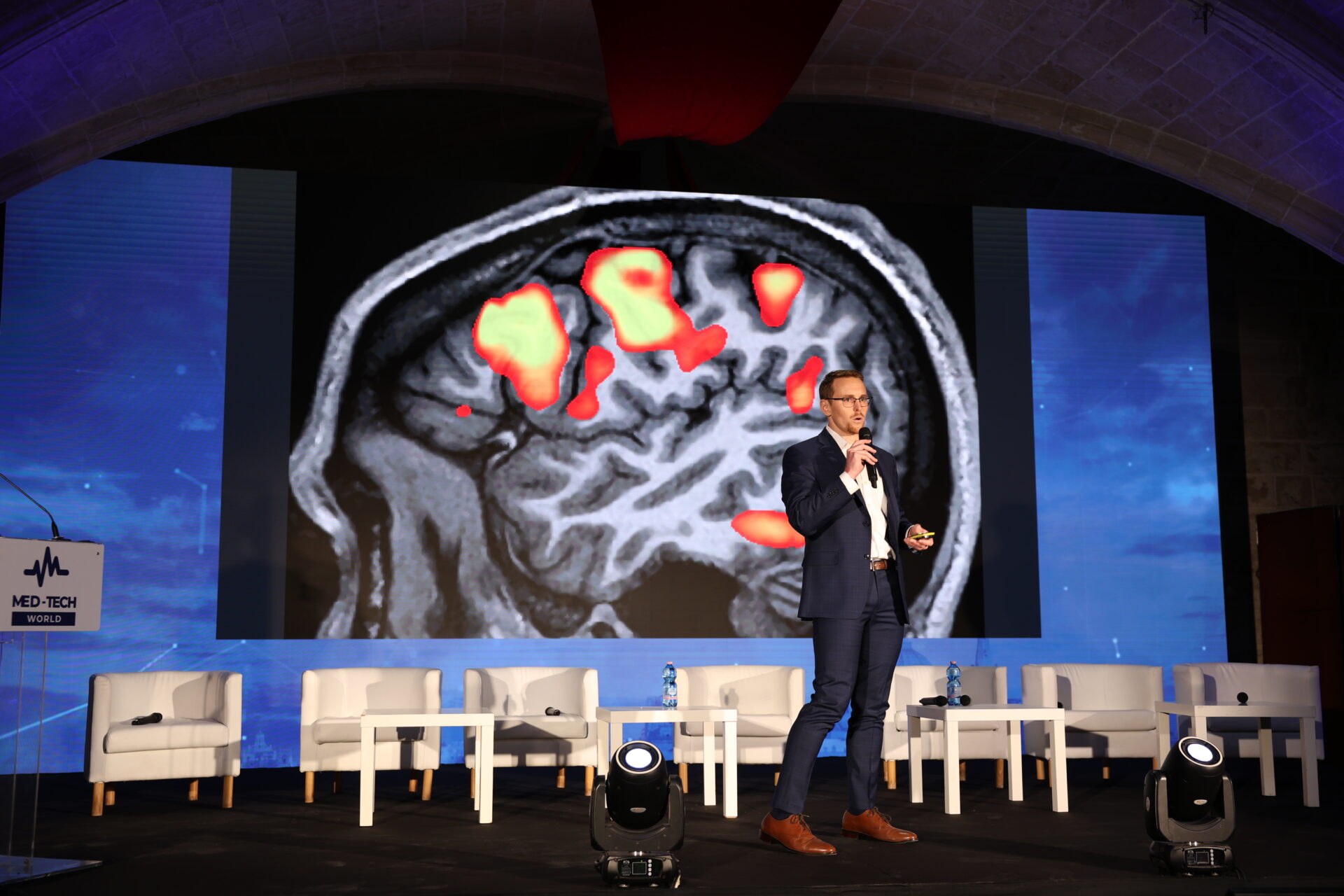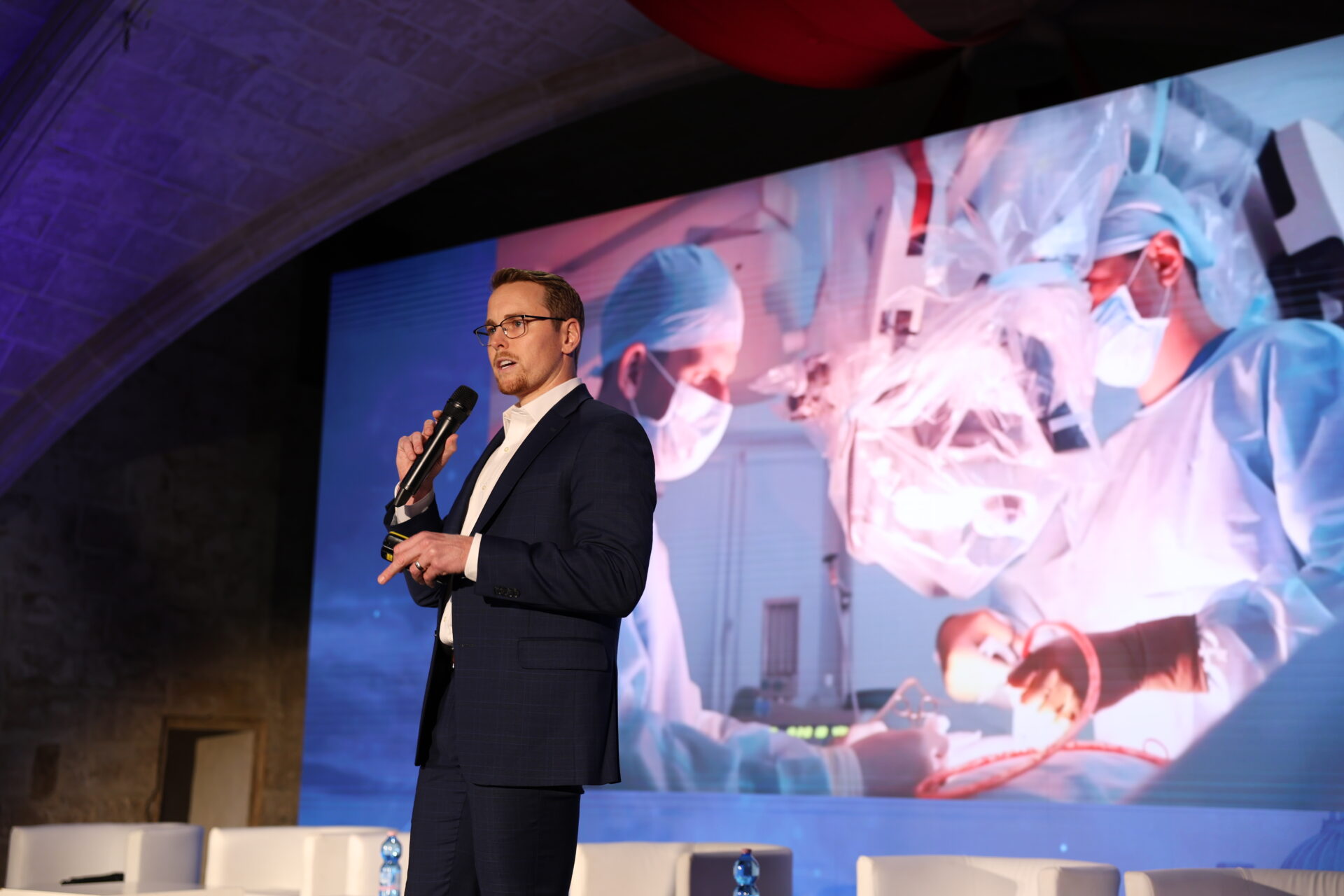
Matthew Calleja
22nd November 2023
NeuroRevolution: Cerebral Catheter Tech Transforming Lives
Wesley Jones, the Co-Founder and CEO of Vonova, took the stage at the La Valette Hall of the Mediterranean Conference Centre on Day 1 of Med-Tech World. He shared his insights and experiences on how his company is transforming the field of neurology through Cerebral Catheter Technology, supporting patients with drug-resistant epilepsy and other conditions.
The reality of neurology patients

Imagine for a moment a beloved grandpa or uncle of yours who suffers from drug-resistant epilepsy. No pills can stop his seizures. He lives in terror, isolated and helpless. His last hope is brutal brain surgery. They will slice his skull and cut out parts of his brain. He may die, or lose himself. He faces a cruel dilemma: to endure or to risk. This is his and your family’s nightmare.
This is the reason innovation is needed in this medical sector.
“The human brain is a dynamic and intricate network,” began Wesley Jones, an entrepreneur well-experienced in the difficulties shadowing the neurosurgery frontier. “Understanding these 86 billion neurons and distinct electrical patterns is key to unlocking cures to epilepsy and other neurological disorders.”
“However, the reality today is we just simply do not have enough data to fully understand these diseases.”
Jones explained the challenges and opportunities of understanding and treating the human brain. Current noninvasive techniques like MRI or EEG cannot capture its high-resolution activity. He said that the only way to get this data is through invasive brain surgery, which involves drilling holes and cutting through the skull and the dura.
Although Neuralink and NeuroPace have developed devices to record or stimulate the brain, they still face limitations in terms of data quality and quantity. There is no doubt a need for a less invasive pathway to the brain surface.
Cutting-edge catheter-based technology
Introducing Vonova, a company dedicated to developing a breakthrough catheter platform that can access the brain surface without drilling through the skull.
“This is the first real alternative to brain surgery, opening up a new market for epilepsy diagnosis,” asserted Jones before describing the innovation. The platform consists of two distinct devices.
- The cerebral catheter is inserted through a vein in the subclavian region and guided to the superior sagittal sinus, a large venous channel on top of the brain. The catheter then creates a small opening in the dura, the membrane that covers the brain, and delivers the ATLAS device.
- The ATLAS device is a brain interface technology that can record and stimulate neural activity on the brain surface. It unfurls to cover an area of 20 square
centimetres, consisting of 36 electrodes designed specifically to measure seizure activity. The ATLAS device can measure the local field potential with high precision, without the need for open surgery.
Diagnostic and therapeutic applications
The invasive brain surgery patients of drug-resistant epilepsy and similar disorders currently have to go through is a risky and costly procedure, and only 1% of the patients in need ever receive it.
Instead, the catheter platform can provide a less invasive and more accessible way to map the brain’s activity and pinpoint the source of the seizures. It can also deliver electrical stimulation to the brain to treat seizures and alter the disease cells.
“It’s not science fiction. The technology is in our hands,” stated Jones.
Vonova has completed its first preclinical study in animals at UCLA, with the renowned Dr. Gary Duckwiler, the chief of neuroradiology. The study confirmed the feasibility and safety of the procedure. Vonova is moving forward with its preclinical testing, aiming to bring this innovative technology to the market and, more importantly, to the patients who need it.
“The time to build is now. We’re on the cusp of a complete paradigm shift, a transformation affecting the lives of millions of patients. To someone who has lost all hope, that’s a tremendously powerful thing.”

About Vonova
Founded in January 2021 by Wesley Jones, Vonova is creating a new way to access the brain surface with less invasiveness for the treatment of drug-resistant epilepsy and other neurological disorders. The innovative system uses the latest in catheter-based technology to interact with the brain surface for diagnostic and therapeutic purposes.
As Co-Founder and CEO, Jones is an accomplished entrepreneur with a Master’s degree in Medical Device Engineering from UC San Diego and a UCLA Health Biodesign Fellowship, where he received the Gloria Appel Award for Entrepreneurial Leadership.
What’s in store for Med-Tech World 2024?
Get ready for the global roadshow series of Med-Tech World for 2024, starting with a bang in Dubai on February 26th. The Intercontinental Dubai Festival City will welcome guests to days full of cutting-edge content, gripping start-up pitches, and talks with prominent investors on stage.
And that’s just the beginning! Throughout 2024, globetrotters can follow the Med-Tech World Summit to new horizons, with events debuting in Barcelona and Berlin. There hasn’t been a greater opportunity than this to exchange ideas and spark transformative developments in the ever-evolving field of medical technology!




